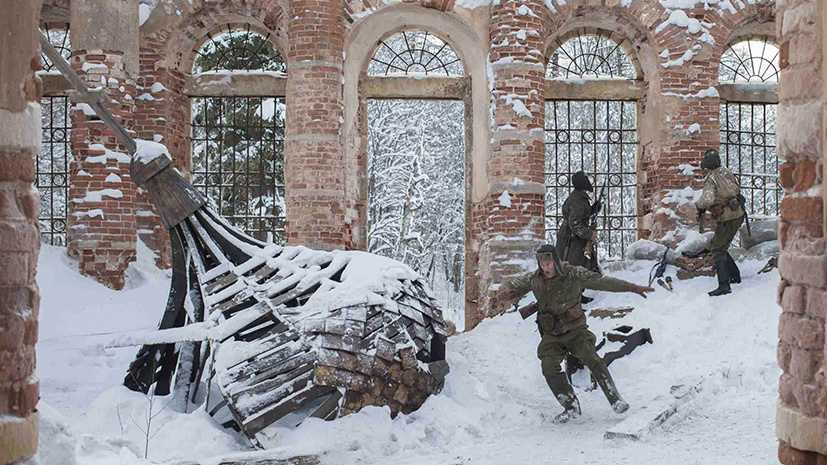The Battle of Rzhev is one of the key episodes of World War II. The fighting lasted more than a year, and losses on each side amounted to about a million people. However, in cinema this theme is covered much less frequently than the battles for Stalingrad, Sevastopol and Moscow, or the blockade of Leningrad.
The action of the story “Atone with Blood” by front-line writer Vyacheslav Kondratiev, who was awarded the medal “For Courage” during the battles near Rzhev, begins immediately after a company of Soviet soldiers entered the village of Ovsyannikovo. However, a small victory does not inspire the fighters, since everyone cares about significant losses.
The film "Rzhev" opens with a kind of background to this moment - shots of the attack itself. The creators of the film wanted to show why the soldiers believe that the village was taken as a "fool", "pushed with live meat." However, the story begins after the bloody battle scene.
- Frame from the film "Rzhev"
- © Film company Triix Media
In the center of the story are several heroes, among whom there is no main one. Approximately equal screen time was allocated to the senior company officer (Sergey Zharkov), the experienced "father" (Alexander Aravushkin), paid-up Kostik Kratsev (Ivan Batarev), as well as the young Vita Somov (Daniil Rozin) and other fighters. It is noteworthy that in the film, as in the story, there is not a single female character, and therefore there is no romantic line.
In between battles, the heroes try to establish a way of life: they collect trophies, from cigarettes to weapons, share German canned goods in anticipation of supplies, while involuntarily recalling peaceful life. One way or another, the personal history of each is reflected in his behavior at the forefront.
For example, Kostik Kartsev classifies himself with the working class, and explains the prison jargon that skips in his speech by the fact that he lived in the criminal grove of Moscow - Maryina Grove.
Behind the bookkeeper Machikhin (Oleg Gayanov), fellow soldiers notice the habit of philosophizing and even give the corresponding nickname. Vitya Somov looks clearly younger than his military comrades: the hero, like many of his classmates, ascribed himself to a year in order to be on the front before the war ended.
The dangers in wartime are not always related to hostilities. However, if the political instructor (Arseny Semenov) monitors the fighting spirit of the soldiers and tries to distract his comrades from defeatist moods, then the special agent Rykov (Grigory Nekrasov) who arrived in the village has a different task. He is ready to shoot anyone for a fascist leaflet - a pass to the side of the enemy. Thus, the heroes have to confront not only the German invaders, but also the brutal wartime order.
Events in the film unfold during the day, and due to the richness of the action, the tape looks very dynamic. Although the memories of the characters are of great importance for the plot, they are all expressed in dialogs - there is not a single flashback, the unity of place, time and action is respected.
- Frame from the film "Rzhev"
- © Film company Triix Media
The village of Ovsyannikovo was recreated at the Rzhev landfill near St. Petersburg. Log houses were brought from the Novgorod region, and military trenches built trenches according to the drawings of the Great Patriotic War. It is interesting that the director of the film, Igor Kopylov, staged a play about the war back in the 1990s, and in a new film he was able to use the information collected earlier.
The filmmakers also said that many actors asked the heroes to give their real names - in memory of the ancestors and relatives who participated in the Great Patriotic War. “They began to seek information through their relatives about their grandfathers and literally brought them into the picture,” noted Igor Kopylov, director of the film.
Alexander Aravushkin added a special detail to the image of his character: in the frame he appeared with a rowan branch - the same as he saw in the photograph of his grandfather. And Daniil Rozin, for whom this role was a film debut, during the filming began the day with listening to songs of the war years.
“For a Russian to play in a film where there is war, it’s the same as playing a gospel for a believer. This imposes a tremendous responsibility, ”said Oleg Gayanov. Although the actor has been acting in films for many years, this is his first role in the film about the war.
Despite the fact that tragic events are shown in Rzhev, the film as a whole turned out to be life-affirming. All the heroes, each with their own story, are united by a desire to save their homeland, no matter who they were before the war: an intellectual, a street kid, yesterday's graduate with romanticized ideas about life, a felon, a peasant from a remote village, or a metropolitan. In this case, after the author of the story, filmmakers create ambiguous images that look very reliable.

